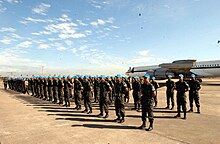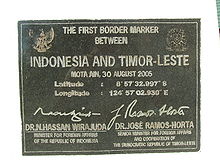UN Security Council resolution 1573
|
UN Security
Council Resolution 1573 |
|
|---|---|
| Date: | 2004 |
| Meeting: | 5079 |
| Identifier: | s / RES / 1573 (2004) ( document ) |
|
|
|
| Poll: | Pro: 15 Ent. : 0 Cons: 0 |
| Object: | The situation in East Timor |
| Result: | accepted |
|
|
|
| Composition of the Security Council 2004: | |
| Permanent members: | |
| Non-permanent members: | |
|
|
|
|
|
|
With resolution 1573 of the UN Security Council , it was decided to extend the mandate of UNMISET by a final period of six months until May 20, 2005, while maintaining the task, configuration and size. The resolution was passed on November 16, 2004 with reference to resolutions 1410 , 1473 , 1480 and 1543 .
background
After the Indonesian occupation from 1975 to 1999, East Timor was initially under UN administration. After the country was granted independence on May 20, 2002, the United Nations Assistance Mission in East Timor (UNMISET) stayed to provide assistance. In 2004 the final drawing of the border between Indonesia and East Timor was still unclear.
The resolution

The UN Security Council praised the East Timorese government for the peace and stability in the country and also for the consolidation of democracy and the building of state institutions. The UNMISET under the direction of the UN Special Envoy for East Timor (since May 21, 2004 Sukehiro Hasegawa ) was also praised. The further progress in the implementation of the mandate was welcomed, in particular the consolidation phase in accordance with Resolution 1543. The bilateral and multilateral partners of East Timor were recognized for their valuable support, particularly with regard to institution building and social and economic development. Despite the remarkable progress made in recent months, the UN Security Council notes that East Timor does not yet have the capacity for self-reliance, such as in key functions of public administration, law enforcement and security. The UN Security Council welcomed the strengthening of cooperation and good relations between East Timor and its neighbors and encouraged the further development of concrete agreements on the course of the border and other outstanding issues. The Serious Crimes Unit (SCU) is recognized for its efforts to complete its investigation in November 2004. Further trials and other activities should be completed by May 20, 2005. The UN Security Council noted with concern that the SCU may not be able to do justice to the victims of the 1999 East Timor crisis . The reasons for this are the lack of time and resources. The reports of the United Nations Secretary-General Kofi Annan on UNMISET of April 29 (S / 2004/333) and November 19, 2004 (S / 2004/888) were noted and the recommendations contained therein were welcomed. The UN Security Council reaffirmed its responsibility to promote security and long-term stability in East Timor.
The UN Security Council decided to extend UNMISET's mandate until May 20, 2005. The tasks of UNMISET, as well as its structure and size, should remain in place so that it can fulfill its mandate and maintain what has been achieved so far. UNMISET was commissioned to focus more on the implementation of its exit strategy , in particular through the increased involvement of and the assumption of tasks by Timorese in the three program areas of the mission. The Timorese, with continued support from the United Nations and bilateral and multilateral partners, should take responsibility if UNMISET is ended. The UN Security Council urged donor states to continue their indispensable support for East Timor, for example by participating in the donor conference, which was scheduled for March 2005. The UN relief agencies and multilateral financial institutions were also urged to begin planning immediately for the smooth transition of East Timor from the peacekeeping operation to a viable support network for development. Furthermore, the UN Security Council saw a need to combat the impunity of perpetrators of human rights violations. In this context, the UN Security Council took note of Kofi Annan's intention to explore possible ways of doing this. The Secretary General has been instructed to report closely and regularly to the UN Security Council on developments on the ground and the implementation of this resolution. A report should be made within three months, the final report in May 2005. The Security Council decided to continue to actively deal with the matter.
Follow-up time
The border with Indonesia was 97% fixed since 2006. Controversial with Indonesia was initially the affiliation of the small uninhabited island of Fatu Sinai ( Pulau Batek ), 37 hectares between Memo (Suco Tapo / Memo ) and the Indonesian Dilumi ( Belu administrative district ) and areas around the exclave Oecusse ( Área Cruz in Passabe , Citrana- Triangle in Nitibe ) as well as the exact modalities of a corridor from Oecusse to the main state territory. In 2013 the dispute over the area at Memo was settled. By this time, East Timor had already given up its claims to the island of Fatu Sinai. The two areas on the border of the exclave Oecusse remained as points of contention until 2019. Negotiations have also been taking place since 2015 on the drawing of maritime boundaries. The border disputes between Australia and East Timor over the definition of the maritime border in the Timor Sea and the associated use of mineral resources remained unresolved until 2018 .
On May 20, 2005, SCU and the Special Panels for Serious Crimes (SPSC) ended their work in East Timor. The UN-based judiciary had tried 391 people, but 316 of them were in Indonesia. 87 defendants, mostly fellow travelers in pro-Indonesian militias , were jailed. did not want to incriminate, Indonesian officials from the administration and the military were not held accountable. During the 2006 riots in East Timor , the SCU office was ransacked and important evidence against Indonesian suspects was destroyed.
The UN missions in East Timor ended on December 31, 2012.
See also
Individual evidence
- ↑ Jakarta Post: RI, Timor Leste agree to resolve border problems, boost ties , August 27, 2015 , accessed August 28, 2015.
- ↑ Monika Schlicher: East Timor faces up to its past ( Memento of the original from November 7, 2017 in the Internet Archive ) Info: The archive link has been inserted automatically and has not yet been checked. Please check the original and archive link according to the instructions and then remove this notice. , missio 2005, ISSN 1618-6222 (PDF; 304 kB)
- ↑ ABC, May 31, 2006, Serious Crimes Unit office looted in Dili

